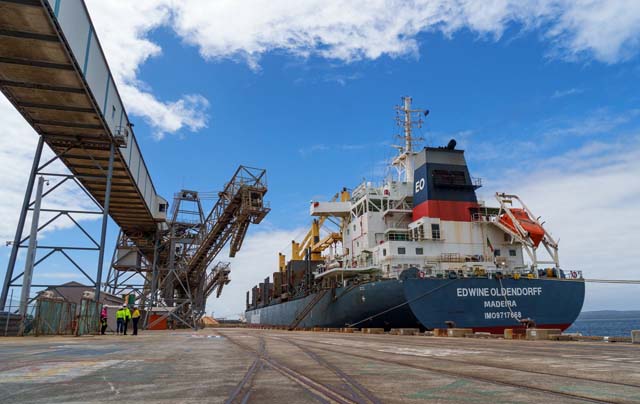Dry bulk ship operator Oldendorff Carriers has been testing second-generation advanced biofuels, as part of a research agreement with the Massachusetts Institute of Technology’s (MIT) Center for Bits and Atoms (CBA).
The research agreement investigated improvements in ship design, propulsion, and alternative energy sources to help achieve the IMO 2050 decarbonisation goal. Under the agreement, Oldendorff Carriers asked MIT to conduct a study on the long-term stability and degradation of a B20 advanced biofuel blend.
Biofuels offer a drop-in fuel option, reducing GHG emissions from a life-cycle perspective, but biofuels are considered more prone to oxidative degradation due to the presence of unsaturated fatty acids, which are inherent in the vegetable oils and animal fats from which the fuel is derived. Oldendorff and MIT set out to investigate these concerns about the stability and degradation of biofuel blends with conventional marine fuels over time when stored in bunker tanks.
The biofuel degradation study was led by MIT research scientist Dr Patricia Stathatou. She has recently moved to the Georgia Institute of Technology, but is still affiliated with the MIT.
The vessel Edwine Oldendorff bunkered with an advanced B20 biofuel – consisting of a 20% bio-oil derived from used cooking oil blended with VLSFO – in January 2022.
According to Oldendorff, there had been limited research on the degradation of biofuel blends, existing studies primarily focusing on first-generation biofuels (derived from food-crops) and/or distillate biofuel blends rather than advanced residual biofuel blends. A biofuel blend is more complex than a homogenous product.
The study monitored eight chemical parameters over an extended one-year period, under a variety of storage conditions. Unlike previous studies that focus on fewer of these parameters, this research investigated the impacts of various storage conditions on the parameters. 15 1 litre samples of the B20 biofuel blend were analysed, divided into three storage groups. Each group was stored at different temperatures, 3 deg C inside a refrigerator, 23 deg C at ambient lab conditions, and 50 deg C inside an incubator. Within each group, there were five samples stored in identical containers: sealed steel container, open steel container, open steel container with 5% water added, sealed steel container with 5% water added, and transparent sealed glass bottles. These storage conditions were selected to closely replicate typical onboard fuel storage conditions. The impact of storage temperature, air, light, and water on the fuel quality over time was examined.
The eight chemical parameters tested were acid value, microbial contamination, total sediment potential, water and sediment, peroxide value, density, viscosity, and oxidation onset temperature. The biofuel blend did not contain any biocide or antioxidant, allowing assessment of natural degradation over time. Acid value and microbial contamination were tested monthly, while the remaining parameters were tested quarterly.
After a thorough analysis, fuel degradation was observed:
- Low levels – <10 colony-forming units per millilitre (CFU/ mL) – of microbial contamination (MBC) were observed after the first month of storage in almost all samples, irrespective of storage conditions. MBC increased over time, reaching almost 50 CFU/mL in samples exposed to light. FAME content in biofuels encourages microbial growth as microorganisms biodegrade natural fats and oils. MBC can lead to operational problems, including fouling of tanks, pipes and filters, tank corrosion, and fuel injection equipment damage. Conclusion: biocide addition is highly recommended to preserve blended biofuel for an extended period.
- Oxidative degradation, began from M3-M6 onward, as indicated by a significant increase in peroxide values, a slight increase in acid value, and a slight decrease in oxidation onset temperature. Addition of antioxidants is recommended together with regular monitoring of fuel quality for long-term onboard storage, especially with higher biofuel blends.
No sediment was generated after thermal ageing and there was no observed sediment formation or water increase over time.
Although exposure to air, water and light contributed significantly to fuel degradation, the impact of storage temperature on degradation remains unclear.
The findings were presented by Stathatou at the American Institute of Chemical Engineers (AIChe) Annual Meeting in Orlando, in a presentation titled Assessing the long-term stability & degradation of an advanced marine biofuel blend.



